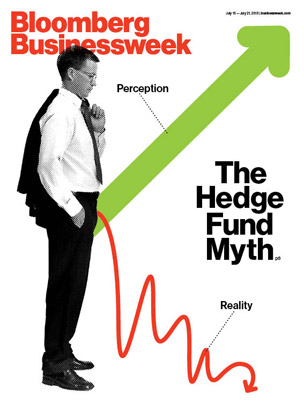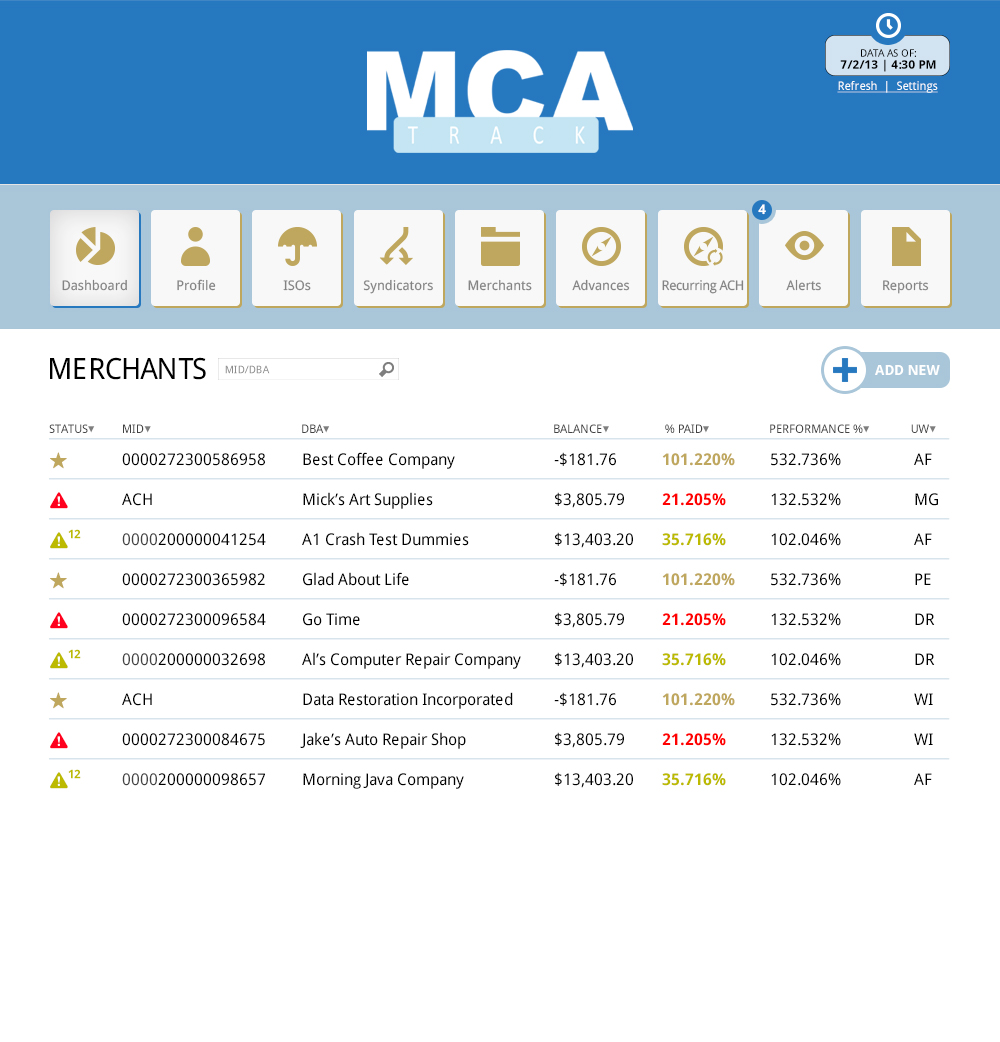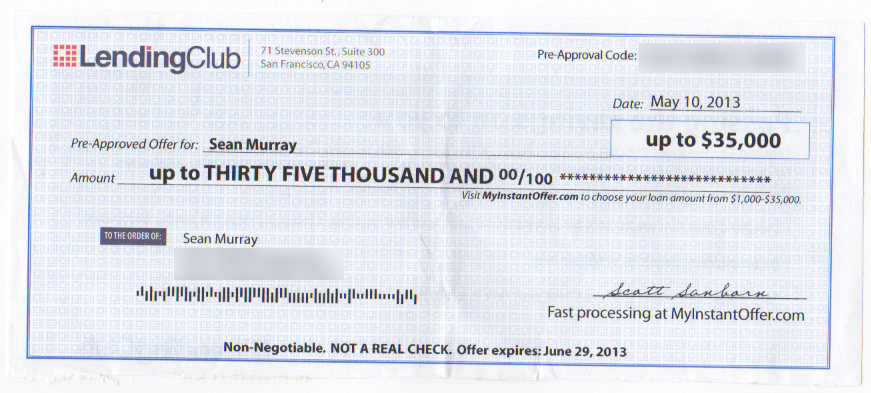Loans
Split Funding is Here to Stay
August 21, 2013 I’ll say it for the hundredth¹ time, the advantage of split-funding is the ability to collect payments back from a small business that has traditionally had average, weak, or poor cash flow. Let’s put that into perspective. There is a distinct difference between a working business with poor cash flow and a failing business. A failing business is typically not a candidate for merchant cash advance or similar loan alternatives.
I’ll say it for the hundredth¹ time, the advantage of split-funding is the ability to collect payments back from a small business that has traditionally had average, weak, or poor cash flow. Let’s put that into perspective. There is a distinct difference between a working business with poor cash flow and a failing business. A failing business is typically not a candidate for merchant cash advance or similar loan alternatives.
Poor cash flow could be the result of paying cash up front for inventory that will take a while to turn over. A hardware store with a healthy 50% profit margin may be able to turn $10,000 worth of inventory into $15,000 in revenue over the course of the next 90 days. The only problem is that the full $10,000 must be paid in full to the supplier on delivery.
Enter the merchant cash advance provider of old that discovers the hardware store has had a fair share of bounced checks in the past, mainly because of the timing of payments going in and out. Cash on hand is tight, the credit score is average, but the profit margin is there. Most lenders would take a pass on financing a transaction that carries legitimate risk such as this one does, that is until the ability to split-fund a payment stream became possible.
Advocates of the ACH method tout that it’s just so much easier to set up a daily debit and scratch their heads and wonder, “man, why didn’t we think of just doing ACH in the first place?”
The thing is, people did think of it and they concluded that for a large share of the merchants out there that needed capital, it didn’t make financial sense to try and debit out payments every day with the hope that there would always be cash available to cover them. Banks have had a hard enough time collecting just one payment a month, so what makes 22 payments in a month so much more likely to work?
I’m not inferring that there is something wrong with the daily ACH system that has taken the alternative business lending industry by storm. There’s plenty of situations for which that may be the best solution, especially for businesses that take little or no credit card payments. My point is that the split-funding method isn’t going to shrivel up and die. It’s here to stay. So long as businesses have electronic payment streams, they will be able to leverage them to obtain working capital.
When it comes to splitting card payments however, it’s important for a business to have faith in the payment processor. Reputation, compatibility with payment technology, and the assurance that the business will be able to conduct sales just as it always has are important. If you’re a funder, ISO, or account rep, it’s your responsibility to make sure that those three factors are addressed. A lot of processors are willing to split payments but they haven’t all made a name for themselves in the industry. Integrity Payment Systems (IPS) comes to mind as one that almost everyone works with and I’ve been in touch with Matt Pohl, the Director of Merchant Acquisition of IPS for some time. He’s been nice enough to share a little bit about what makes a split partner special, and what has made them particularly stand out in the merchant cash advance industry.
Clearly, the role of the credit card processor has diminished over the last couple years when it comes to merchant funding. ACH/Lockbox models have become more prevalent which created a sales mindset that switching a merchant account was more of a hindrance than a necessity. Some argue the decline in profit margin on residuals, due to price compression, made it no longer worth the time and effort to make an aggressive pitch to switch the merchants processing. ISOs also argue that too often merchants have reservations to switch processors because of previous bad experiences, cancellation fees, or because they simply know its not necessary in order to be funded. This is where it’s important to have the RIGHT split partner, not just any split partner
What makes Integrity Payment Systems a “special” split partner is the fact we control the settlement of the merchants funds, in house. IPS is partnered with First Savings Bank (FSB), which allows us a unique way of moving money. Because of our state-of-the-art settlement system and direct access to FSB’s Federal Reserve window, we eliminate the necessity of having layers of financial institutions behind the scenes that merchants funds typically filter through. This is a HUGE benefit to cash advance companies for several reasons. First, we implement the fixed split % when we receive the request, in real time. This allows the deal to be funded quicker. Secondly, since we handle the settlement process we have access to the raw authorization data which allows us to provide comprehensive reporting on a daily basis from the previous days activity. But also we can do true next day deposits, including Friday, Saturday, and Sunday funds available for the merchant on Monday morning. This is especially valuable when selling to restaurants/bars, or any other industry with a lot of weekend volume. Lastly, IPS makes outbound calls to merchants, on behalf of the sales agent and cash company, to download and train the merchant on their terminal. A confirmation email is sent to the agent which includes any batch activity so the deal can fund.
As an added example of this, on the last week of every month, the merchant boarding and sales support team fully understands that our MCA partners have monthly funding goals they need to reach. The IPS team goes above and beyond to ensure merchants get setup properly in time so those accounts can be funded before the month is over. We have a motto at IPS that the sales force are our #1 customers, and nowhere is that more apparent than by the way we take over all the heavy lifting once the agent gets the signatures on our contract. We firmly believe that by helping the agent by taking over the boarding process, that this will allow them to do what they do best, sell more deals!! A lot of competitors expect the agent to be involved in the boarding process, and that’s valuable time that takes them away from selling.
IPS has opened their doors to every MCA company that wishes to have an exceptional split funding partner/processor. We have all the necessary tools to provide this service the right way, and we want the opportunity to earn the business of every working capital provider out there. You don’t have to listen to a sales pitch from me, because I strongly believe that our reputation in the cash advance space speaks for itself. We would love the opportunity to talk to any MCA provider about a few additional services we offer utilizing our settlement system that will allow ISOs to fund more deals.
– Matt Pohl
(847) 720-1129
Integrity Payment Systems
One thing I can personally attest to about Integrity is their human factor. You can actually meet some of their team and see inside their office in the fun youtube video below:
Getting deals done
Ultimately, the financing business is about getting deals done and there are countless small businesses that just won’t ever be a candidate for ACH repayment. Heck, for many years the merchant cash advance industry wasn’t even a financing industry of its own, but rather it was one of many acquisition tools for merchant account reps. (See: Before it Was Mainstream). Technically it still is. You don’t want to sign up a merchant for processing and then have to move the account because the processor doesn’t split or because there is no dedicated customer service. I’ve been in that situation before personally and it’s a nightmare.
There’s a reason this website which is dedicated mainly to merchant cash advance is called the Merchant Processing Resource. You can’t know everything about cash advance without knowing about merchant processing. Get acquainted!
If you’d like to read the lighter side of Merchant Cash Advance History, you just might want to check out MCA History in Honor of Thanksgiving. 😉
¹ I said it for the 99th time on the Electronic Transactions Association’s Blog in Preserving the Marriage Between Merchant Cash Advance and Payment Processing
When Merchant Cash Advance isn’t the Right Fit
August 12, 2013 “I know you do a million in gross sales monthly but since you process only $5,000 in credit cards, we can only approve you for $7,000.”
“I know you do a million in gross sales monthly but since you process only $5,000 in credit cards, we can only approve you for $7,000.”
Before ACH repayment became mainstream, the MCA industry was incredibly restrained in its ability to help businesses. A merchant seeking a half million dollars with the cash flow and size to back that request up was being told that the absolute best they could get would be maybe $10,000, and that’s with a 100% holdback in place instead of the industry standard max of 30-35%. It was an awkward sale for both parties.
To pitch a business owner generating $12 million a year in sales a paltry $10,000 is like telling your boss that the only thing you did at work this month is forward a single e-mail. To the business owner, they’re probably left wondering if lending really has dried up that much or perhaps they’re wondering if they’re just talking to the wrong people. Some of these mismatched situations actually turn into closed deals. I can personally remember one where a semi-serious request for $2 million became a $6,000 signed contract. I think they waited only 24 hours before applying for a renewal. The majority of these sales calls go nowhere though because what’s being offered is not a fit for what is needed.
It’s okay to have mismatches in life. As a salesman, your product is not the right solution for EVERY problem, no matter what your rebuttal script says. If a man is wheeled into an emergency room with 7 deep stab wounds, Johnson & Johnson is going to have to pass up the opportunity to offer him Band-Aids as the answer. A million Band-Aids might work, but they’re not the right solution.
In 2013, I am hearing a wider call to diversify product offerings to stay competitive. Yes, offering a fixed daily repayment loan based off of gross sales is a nice way to compliment the purchase of future credit card sales, but that’s not really diversity anymore, that’s a necessity to stay alive. By really diversifying, I’m talking about financial products beyond daily repayment loans and advances. Almost everyone agrees that being able to service more deals is a good thing but when it comes right down to it, they may see it as a distraction from their main focus.
We’ve all seen a friend or two bite off more than they can chew by trying to broker an SBA loan or commercial real estate deal. There’s no shortage of financial companies sitting on the periphery of the MCA industry waving a flag that says “if a deal isn’t compatible for you, then send it our way.” They don’t really speak the MCA language though and they expect you to do a lot of the closing and negotiating on your own. Some of these deals take months to process and if the lender believes the deal is only a one-time thing, they might not even pay you for it. Ugh! Looking at it from this perspective, perhaps it’s better to just stick with MCA and let every other type of deal fall by the wayside, that is until you look at your marketing expenses again and wonder…
An inbound lead is one that you’ve already paid for, so if they’re not a candidate for a daily repayment loan or advance, then what is the most efficient way to monetize and service them? Who can you really depend on to make servicing it a reality and how long will it take? How easy will it be? I searched beyond the industry for answers but began to find them inward. It seems New York City based Strategic Funding Source has recognized the need for product diversification and is eager to assist account reps in servicing more clients and closing more deals. Your marketing dollars are already spent, so now it’s time to monetize what they’re bringing in. There is a universe beyond daily repayment deals and if you hope to stay ahead of the curve, I recommend you become intimately familiar with programs like invoice factoring and accounts receivable factoring. You can and should be doing deals of this nature every month, not once in a blue moon.
While I like to consider myself knowledgeable on a wide range of financial topics, Lenny Leff, who heads Strategic Plus, a new division of Strategic Funding Source, has offered to write his own regular column on Merchant Processing Resource.
I spoke to David Sederholt, Strategic Funding Source’s COO, about this first in regards to Lenny’s role at the company:
“Through this new division of Strategic Funding Source, led by Lenny, we can say ‘yes’ to more businesses seeking capital to grow and are not limited to cash advance and loan products. We take a human approach to financing and know that the needs of small business owners are as diverse as the businesses themselves. With more product offerings, we are able to continue to be true partners to the small businesses we finance.”
– David Sederholt, Strategic Funding Source COO
Lenny’s posts will provide guidance and information about opportunities outside of MCA. After a few in-person meetings, I think he is uniquely positioned to discuss this topic, especially considering his prior experience in the MCA industry. I asked if Lenny would introduce himself in this post and he added the following:
“I am happy to be joining Strategic and look forward to sharing my 15+ years experience in factoring and asset based lending. The blog will give business owners and ISOs the opportunity to learn more about the different solutions and alternatives available when they go to someone offering a one-stop shop; Purchase Order Financing, Invoice Factoring, Equipment Leasing, Healthcare Lending to Business Loans and MCA. Our goal is to expand the knowledge within our community and help our partners find customized financing for their clients. We are thrilled and excited to share our insights with Sean and the Merchant Processing Resource site.”
– Lenny Leff, Strategic Plus
When the deal doesn’t fit, will you try to sell it anyway? Will you throw it out? Or will you try to monetize the lead you’ve already paid for? I don’t like the first two options… and I’m sure many of you don’t either.
Learn more about Strategic Plus at http://www.sfscapital.com/news/view/3596
Contributors
David Sederholt
Lenny Leff
Discuss factoring on DailyFunder
http://dailyfunder.com/showthread.php/353-PO-Financing-Factoring/page2
Hey Banks, Where’s the Profit?
July 21, 2013 One of our favorite points of reference, a document from 1996 has finally been deleted from the www.frbsf.org website. We didn’t save the document but we’ve thankfully used this quote from it before:
One of our favorite points of reference, a document from 1996 has finally been deleted from the www.frbsf.org website. We didn’t save the document but we’ve thankfully used this quote from it before:
There’s a large small business segment that needs and wants to borrow on a commercial basis, but their needs are very small. Business owners want $10,000, $20,000 or $30,000 loan–the average is somewhere around $25,000. Traditionally, that’s been a very unprofitable business for a bank.
– The Federal Reserve Bank of San Francisco
Now compare that with the results of a 2011 study that found banks lose money on customer checking accounts:
The average checking account cost banks $349 in 2011
The average revenue per account is just $268
This implies a loss of $81 a year
Source: Moebs Services via Bankrate.com
So a small business opens up a checking account and it may be causing the bank to lose money. So naturally a bank would lend that money out to turn a profit then right? Well, not so fast. Between the cost of processing a loan, servicing it, trying to collect on it, repossessing collateral (in some cases), and the potential loss on a default, lending isn’t such a good bet either, especially when there are legal caps on interest rates.
Folks in the alternative business lending industry have been saying for years that they are satisfying a role that banks will not fill. Banks do small business loans alright, but their sweet spot is a $1 million loan and above.
John Smith business owner who has banked with ABC community for 20 years may think that such strong loyalty warrants an approval for the $20,000 he seeks. What he doesn’t know is that the bank has been trying to get rid of him for 20 years.
In an article by the Motley Fool, Bank of America is described as a bank that has let their customers know exactly how they feel about loss inducing checking accounts. In 2012, they were ranked as the worst performing bank across the board for customer service.
It’s easy to point the finger at banks as money grubbing crooks every time they charge a bogus sounding fee, but many of those fees are keeping them afloat, very profitably afloat mind you, but still afloat.
My favorite fee that my own bank has come up with is a “teller interaction fee.” If I make a deposit or a withdrawal with a human teller instead of at an ATM, a fee is assessed.
I use the ATM every time. I’m guessing my bank would like me to pack up and leave… that is unless I’m looking to borrow a million bucks. God knows how much time that will take and how much paperwork they’re going to ask for though. I think I’d rather just apply for a merchant cash advance 😉
– Merchant Processing Resource
https://debanked.com
MPR.mobi on iPhone, iPad, and Android
Real Cover of Businessweek
July 11, 2013 This is a real Businessweek cover which leads up to the article Hedge Funds are for Suckers. So much for subtle imagery…
This is a real Businessweek cover which leads up to the article Hedge Funds are for Suckers. So much for subtle imagery…
In other news, Hedge Funds are now permitted to generally solicit investors and I expect they will start blanketing the MCA industry or the people in it. Read: SEC Lifts Ban on Hedge Fund Ads
The Merchant Cash Advance Abridged Bible
July 10, 2013Whether you’re an investment fund researching the merchant cash advance industry or an account rep that’s just been handed a phone book on his first day of work, these 5 slides will teach you almost everything you need to know:
Questions? E-mail sean@merchantprocessingresource.com

– Merchant Processing Resource
https://debanked.com
MPR.mobi on iPhone, iPad, and Android
MCA Track – A Merchant Cash Advance Back End
July 6, 2013Running your funding business off of excel spreadsheets or clunky old software that wasn’t meant for the Merchant Cash Advance (MCA) market? You might want to consider using something that was both made and used by MCA people. A couple weeks ago, Benchmark Merchant Solutions gave me a private demo of their all-in-one back end system to manage incoming and outgoing payments for both split-funding and ACH deals.
It had a lot of nice features and certainly would make it possible to manage your books with ease. The reports are very easy to produce, read, and make sense of. Alerts can be set up for merchants that have not processed for any gap of time you set. ACH rejects are automatically recorded and flagged.


At the current moment, the only direct split-funding integration it has is with Benchmark Merchant Solutions. They will be directly integrating with other processors in the coming month. The system uses a proprietary ACH provider.
Contact: Zalman Notik
Phone: 212-444-9567
zalman.notik@mcatrack.com
Benchmark Merchant Solutions is a registered ISO and MSP of Deutsche Bank AG, New York. This is not a paid ad or review. The Benchmark team is run by solid folks.
Having issues with your books? Make it easy with MCA Track.
– Merchant Processing Resource
https://debanked.com
MPR.mobi on iPad, iPhone, and Android
Alternative Business Lending With Steve Sheinbaum on #BusinessFuel
May 27, 2013This past friday, I joined in on Lendio’s #BusinessFuel on twitter, a twitter chat that is held weekly. There were many alternative business lending experts in attendance including Steve Sheinbaum, the CEO of Merchant Cash and Capital. He was the featured guest and the questions were directed at him for the last half hour. I’ve created a storify summary below with all of the important pieces:
Alternative Business Financing
A small group of experts got together on Lendio’s #BusinessFuel twitter chat to discuss alternatives to banking with Merchant Cash & Capital’s CEO, Steve Sheinbaum
Storified by Sean M· Mon, May 27 2013 10:13:11
QUESTION 1 ———–>
QUESTION 1 ———–>
QUESTION 2 ———–>
QUESTION 2 ———–>
QUESTION 3 ———–>
QUESTION 3 ———–>
QUESTION 4 ———–>
QUESTION 4 ———–>
The CEO of Merchant Cash and Capital, Steve Sheinbaum Joined the Chat
MCC’S ANSWERS BELOW
Lending Club in Action
May 26, 2013Soon after Google Inc. bought a stake in the personal loan company Lending Club, I apparently got added to their mailing list. I wonder if Google is providing Lending Club with better targeted data to close more loans. They probably are, although I probably shouldn’t be on this list.

I have seen the fake check method used many times by companies to excite mail recipients. The envelope also looked pretty fancy and it had a warning notice on it indicating that the contents of the letter were time sensitive. Do mailers still work these days? This leads me to believe they do. After all, I opened the letter and read through everything instead of throwing it away in the trash like I did with the other junk mail I got…





























